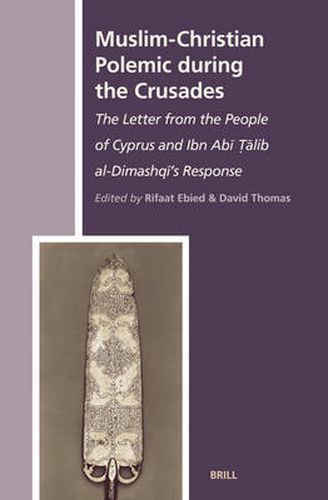Readings Newsletter
Become a Readings Member to make your shopping experience even easier.
Sign in or sign up for free!
You’re not far away from qualifying for FREE standard shipping within Australia
You’ve qualified for FREE standard shipping within Australia
The cart is loading…






This volume comprises an edition and English translation of the response in Arabic made by the fourteenth century scholar Ibn Abi Talib al-Dimashqi to a Letter sent to him by anonymous Christians from Cyprus. The Christian letter was also sent to al-Dimashqi’s contemporary Ibn Taymiyya, and this response is thus a parallel to Ibn Taymiyya’s Al-jawab al-sahih. In their Letter the Christians subtly suggest that the Qur'an supports Christian doctrines. Al-Dimashqi replies with a comprehensive series of elaborate and wide-ranging arguments that incorporate not only themes familiar from earlier polemical works but also his own original points. His response is thus an important source of information about the development of Muslim interfaith attitudes, and a significant example of polemic in the later medieval period. The edition presents the two parts of this correspondence in parallel Arabic and English versions, together with an extensive introduction, textual notes and commentary.
$9.00 standard shipping within Australia
FREE standard shipping within Australia for orders over $100.00
Express & International shipping calculated at checkout
This volume comprises an edition and English translation of the response in Arabic made by the fourteenth century scholar Ibn Abi Talib al-Dimashqi to a Letter sent to him by anonymous Christians from Cyprus. The Christian letter was also sent to al-Dimashqi’s contemporary Ibn Taymiyya, and this response is thus a parallel to Ibn Taymiyya’s Al-jawab al-sahih. In their Letter the Christians subtly suggest that the Qur'an supports Christian doctrines. Al-Dimashqi replies with a comprehensive series of elaborate and wide-ranging arguments that incorporate not only themes familiar from earlier polemical works but also his own original points. His response is thus an important source of information about the development of Muslim interfaith attitudes, and a significant example of polemic in the later medieval period. The edition presents the two parts of this correspondence in parallel Arabic and English versions, together with an extensive introduction, textual notes and commentary.